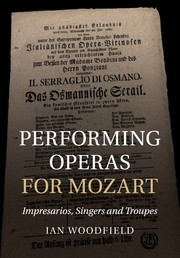Book contents
- Frontmatter
- Contents
- Illustrations
- Figures
- Tables
- Musical examples
- Abbreviations
- Introduction
- 1 Pasquale Bondini
- 2 Die Entführung aus dem Serail
- 3 The Italian troupe in Prague
- 4 The Prague Figaro
- 5 The genesis of Don Giovanni
- 6 The première of Don Giovanni
- 7 The casting of Don Giovanni
- 8 The Leipzig Don Giovanni
- 9 The 1788 Prague Don Giovanni
- 10 Mozart’s music in Leipzig
- 11 Josepha Duschek’s academy (22 April 1788)
- 12 Mozart’s academy (12 May 1789)
- 13 Guardasoni in Warsaw
- 14 The première of La clemenza di Tito
- 15 The Leipzig reception of the Da Ponte operas (1792–1794)
- 16 Guardasoni diversifies
- Conclusion
- Appendices
- Bibliography
- Index
1 - Pasquale Bondini
Published online by Cambridge University Press: 05 January 2012
- Frontmatter
- Contents
- Illustrations
- Figures
- Tables
- Musical examples
- Abbreviations
- Introduction
- 1 Pasquale Bondini
- 2 Die Entführung aus dem Serail
- 3 The Italian troupe in Prague
- 4 The Prague Figaro
- 5 The genesis of Don Giovanni
- 6 The première of Don Giovanni
- 7 The casting of Don Giovanni
- 8 The Leipzig Don Giovanni
- 9 The 1788 Prague Don Giovanni
- 10 Mozart’s music in Leipzig
- 11 Josepha Duschek’s academy (22 April 1788)
- 12 Mozart’s academy (12 May 1789)
- 13 Guardasoni in Warsaw
- 14 The première of La clemenza di Tito
- 15 The Leipzig reception of the Da Ponte operas (1792–1794)
- 16 Guardasoni diversifies
- Conclusion
- Appendices
- Bibliography
- Index
Summary
An informative summary of the rather complicated history of opera and theatre in Dresden during the second half of the eighteenth century appeared in an article in the Allgemeine musikalische Zeitung (AmZ) entitled ‘Von dem italienischen Singspiel in Dresden’. It provides abundant evidence of the continuing strength of the operatic connection between Saxony and Bohemia. The author reports that Giuseppe Bustelli, who formed an opera company in Prague in 1764, was appointed as manager in Dresden in 1765, retaining control of both troupes. In the field of German theatre, the Electoral privilege went to Abel Seyler, and then in 1777 Bondini took over. For the rest of the century, the Churfürstlich Sächsische privilegirte deutsche Schauspieler enjoyed a very high profile in the theatrical firmament, and its productions were reviewed extensively in German periodicals.
Like many an eighteenth-century impresario, Pasquale Bondini’s early experience was as a performer. The first part of his career in Italy can be followed in Sartori’s bibliography, in which his name appears regularly in librettos for performances from the 1750s: Parma and Bologna (1757), Faenza and Forli (1758) and Bologna (1759). From 1760 onwards, he is to be found in Prague librettos, and from 1765 in both Prague and Dresden wordbooks. He was thus a singer with a significant Italian career behind him when he joined Bustelli’s troupe. In 1764, the first year in which the ITS was published, he was listed as one of the ‘parti buffe’ in the Prague company. When he transferred to Dresden, he featured as one of the ‘buffi’, or more specifically ‘buffi caricati’. Some time after 1771, he married Caterina Saporiti, whose career in Italy left traces from 1768 to 1771. After 1773, both singers appear in the ITS lists. Dresden now became the Bondini couple’s home, and all four of their children were baptised in the Hofkirche, which was a centre for musicians from the Catholic regions of Italy, Austria and Bohemia. In the registration document for their first son, Caterina Bondini is described as ‘nata Saporiti’ and Bondini himself as ‘Comoedius Electoralis Cantor’.
- Type
- Chapter
- Information
- Performing Operas for MozartImpresarios, Singers and Troupes, pp. 7 - 24Publisher: Cambridge University PressPrint publication year: 2011

